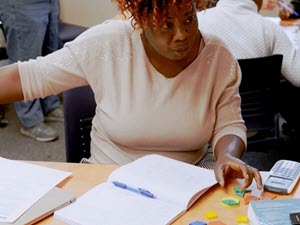
If we want to know what our students really understand, we need to make room for them to share their ideas. Instructional routines provide one way of doing that. "Instructional routines are specific and repeatable designs for learning that support both the teacher and students in the classroom... enabling all students to engage more fully in learning opportunities while building crucial mathematical thinking habits" (Kelemanik, Lucenta, and Creighton, 2016). There are many kinds of routines to try. One example, called Which One Doesn’t Belong? (WODB) is on a Padlet for you to explore. It works well for learners of all ages and in any subject.
We learn best when we learn together, so join the conversation on the WODB Padlet! Note that links to the Padlet and videos later in the article open in a new window, to help you refer back to this Learning in Community article.
After you’ve explored the activity and resources on the Padlet, return to this Learning in Community page to learn more about how students learn from each other.
Figure 1: "Which One Doesn't Belong?" Exercise
Learning Together Through Exploration
Instructional routines are most powerful when everyone gets involved. In the Padlet, your own exploration of the "Which One Doesn’t Belong?" image added to the community’s conversation. When we share our thinking and listen to how others see things, we grow our understanding. Giving students time to explain their ideas builds community, collaboration, and confidence.
In the College and Career Readiness Standards for Adult Education (CCRSAE), the math section highlights these same ideas through the eight Standards for Mathematical Practice (MP). The CCRSAE describes them as “habits of mind” that teachers should help students develop. Using instructional routines reminds us how important it is to include many voices—not just our own. Adult learners bring real-world experience and insight to the classroom, and routines like these help them share what they know.
Video Examples of Student-to-Student Learning
The Padlet includes links to three videos showing how exploration leads to deeper learning. These are also included below. As you review these, refer back to the Padlet and to what you've learned from this article.
- Video 1, Fraction Talk (3:48–7:20 - opens in a new tab): In this video, the teacher starts class with a simple question and gives students time to think and talk in small groups. They use hands-on tools to show what they understand. The teacher welcomes every answer and encourages students to explain their reasoning.
At one point, a student asks another how they counted six green triangles when only two are shown. That question sparks a great discussion, with students using pattern blocks and writing down their ideas to make sense of the problem together.
In that short exchange, students practice several Mathematical Practices, including:
- MP.1 Making sense of problems and not giving up
- MP.2 Reasoning with numbers and ideas, not just following steps
- MP.3 Building arguments and responding to others’ reasoning
- MP.4 Using math to model and explain real situations
As you watch the rest of the Fraction Talk video, look for other moments when students learn from one another. Think about what the teacher might do next based on what she observes.
- Video 2, Measuring Large Objects and Video 3, Instructional Routine: Wrong Answers Only both open in new windows. These two videos—one about measuring and another about intentionally exploring wrong answers—show students asking questions, discussing ideas, using clear language, and solving problems together. As you watch, think about what students bring into the classroom beyond the lesson itself. How do their voices and experiences make the learning richer? How does the teacher build on their contributions?
We Can Help!
The SABES Math Team has many more resources that include instructional routines like these. You’ll find standards-aligned lessons, full math curricula like BeCALM and CALM, and lots of classroom-ready materials. Also, our Math Coaches, all former and current adult education teachers, are here to help.
You don’t have to learn alone! Contact the SABES Math team for support!


